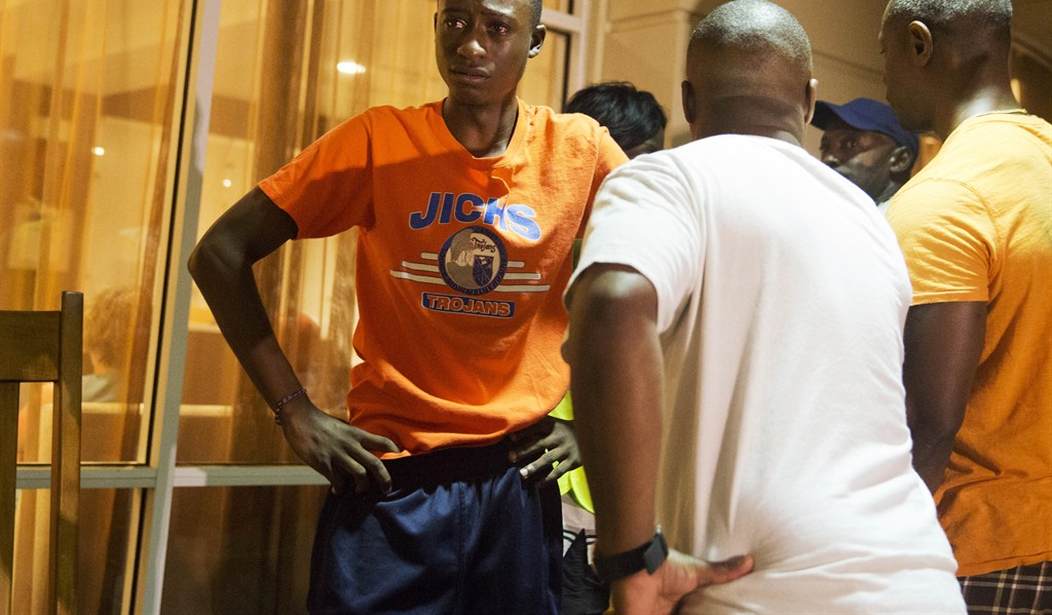With the nation reeling after the tragic events in Dallas and Baton Rouge and racial tensions the highest they’ve been since the L.A. riots, many are left wondering, how did things get this bad? While there are undoubtedly multiple variants factoring into the issue of racial unrest in America, there is one in particular that might surprise you. In his latest book, The Problem with Socialism, economics expert Thomas DiLorenzo exposes shocking details about how socialist government policies are keeping the poor in poverty—especially among the black population—and likely contributing to the unrest we are seeing in many of those communities.
DiLorenzo writes:
Most economists recognize that welfare programs pose a potential “moral hazard” with “benefits,” potentially destroying the incentive to find a job and become financially independent. That’s why President John F. Kennedy declared that the purpose of welfare was to provide “a hand, not a handout.” Welfare policy in America, however, has failed miserably in avoiding this moral hazard. A dramatic illustration of this failure was provided by Charles Murray in his landmark book, Losing Ground. Murray examined how the explosion of welfare benefits in the mid- and late-1960s perpetuated rather than alleviated poverty; in fact, it made it worse. Murray found that from the 1950s until the late 1960s, thanks to America’s vigorous post-war economy, the number of people living in poverty had declined by about a third. But from 1968, as the massive increase in welfare benefits began, to 1980, when Ronald Reagan was elected president, poverty increased by 22 percent. The poverty we’re talking about is “latent poverty,” which means poverty before you factor in welfare benefits. “Poverty” went up because “poverty” became attractive—or, to put it another way, welfare discouraged people from getting jobs, because the more money one earned the more one was likely to suffer reduced welfare payments, food stamps, housing subsidies, and other benefits. In 2012, a Congressional Budget Office study found that a welfare single parent with one child who got a job faced a marginal tax rate (in terms of lost benefits) of between 66 percent and 95 percent. A 2013 Cato Institute study found that the value of welfare benefits for a single family (taking into consideration only seven of 126 federal programs) ranged from $49,175 in Hawaii to $16,984 in Mississippi. A single parent in Hawaii, or in many other states, would have to secure a very well-paying job to compensate for the loss of tens of thousands of dollars in government benefits; the government has, for many welfare families, made getting a job an irrational decision. So it should be no surprise that after spending more than $4 trillion on welfare programs since 1965, the United States has seen poverty increase. With welfare payments so widespread, the stigma that once attached to not working has gone away, replaced by the sense that those who do work in low-paying jobs are chumps. Murray wrote: “For the first time in American history, it became socially acceptable within poor communities to be unemployed. . . .” Welfare programs have become an alternative to work. A 1992 study by economists Richard Vedder and Lowell Gallaway found that only 18 percent of welfare recipients moved out of poverty, compared to 45 percent of poor people who did not receive welfare.
Recommended
The welfare state has done an excellent job of crippling an important cornerstone of an enterprising, free market, capitalist society: the incentive to work. Instead, it has created a dependent class that it serves (with programs) and from whom it benefits (justifying government programs and jobs). The welfare state has also gone a long way toward achieving another goal of many socialists, especially Karl Marx, of the “abolition of the family” (as Marx and Engels advocated in The Communist Manifesto).
This is not to say that the architects of the American welfare state wanted to abolish the family, only that their policies have gone a long way toward achieving it. Between 1960 and 2000, out-of-wedlock births increased by more than 400 percent, and a big driver of that, especially in black communities, was that single parenthood brings government benefits. In 1950, before “the war on poverty,” about 88 percent of white families and 77 percent of black families in the United States consisted of husband-and-wife households. By 1980 the proportion of black families with husband-and-wife households had declined to 59 percent; among white families it was 85 percent. And the numbers continue to get worse. In 1960, 73 percent of kids lived in a traditional two-parent family. In 2013, the number was 46 percent. Single mothers are much more likely to be poor mothers; and all too often welfare payments have taken the place of a husband with a job. Just as there is no longer a stigma to accepting welfare and not working, the welfare state has removed the stigma of “illegitimacy” when so many millions of women give birth out of wedlock and receive child support not from fathers but from taxpayers.
Children born to single parents are three times more likely to suffer behavioral or emotional problems; girls are twice as likely to have children out of wedlock themselves; and boys are twice as likely to become involved in crime. In other words, welfare dependency has a “domino effect” that not only harms society but also destroys people’s lives.
*Excerpt from Thomas J. DiLorenzo’s The Problem with Socialism (Regnery, July 18, 2016).
























Join the conversation as a VIP Member